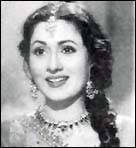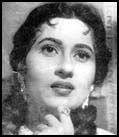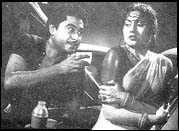|
April 4, 1997
BILLBOARD
QUOTE MARTIAL
MAKING WAVES
SHORT TAKES
ROUGH CUTS
ARCHIVES
|
'He told her if he went away, he would never return. Madhubala was silent. At last, he got up and left --
alone and out of her life'
 During the making of Dhake ki Malmal (1956) in the presence
of Om Prakash, events of a dramatic nature took place that decided
the final shape of the association between Dilip and Madhubala.
Om Prakash was on the sets of the film when he was startled by
a message from Dilip Kumar, who asked to see him. During the making of Dhake ki Malmal (1956) in the presence
of Om Prakash, events of a dramatic nature took place that decided
the final shape of the association between Dilip and Madhubala.
Om Prakash was on the sets of the film when he was startled by
a message from Dilip Kumar, who asked to see him.
Dilip was with
Madhubala in her make-up room and the atmosphere was surcharged.
Om Prakash was requested to simply sit down and be a witness to
the happenings. He watched as Dilip Kumar implored Madhubala,
asking her to go with him and be married that very day. He had
a kazi ready and waiting at his home and he wanted her to leave
with him immediately. "I will marry her today," he emphasised.
It was the condition that he put forth that became the stumbling block:
She would have to leave her father and never
meet him again. Madhubala's refrain was that this was impossible,
and apart from this, she said nothing. "Dilipsaab urged
her repeatedly -- again and again. He asked if this meant she
was not willing to marry him? He told her if he went away now,
he would never return. Madhubala was silent. At last, he got up
and left -- alone and out of her life."
 Gentle as she was,
Madhubala could also be fiercely independent. Forced to decide
between one or the other, she had opted for her family. She may
have thought her father very strict but she was deeply attached
to him, genuinely believing that she was what she was because
of him and it was unthinkable for her to desert her family. It
is another matter that the family did not encourage her to seek
her own happiness. Gentle as she was,
Madhubala could also be fiercely independent. Forced to decide
between one or the other, she had opted for her family. She may
have thought her father very strict but she was deeply attached
to him, genuinely believing that she was what she was because
of him and it was unthinkable for her to desert her family. It
is another matter that the family did not encourage her to seek
her own happiness.
The extent of 'loyalty' that families demanded and got from stars
of the forties and fifties is quite amazing. The era is strewn
with stories of exploitation, both financial and emotional. It
happened to Meena Kumari, Suraiya, Nutan, Kamini Kaushal, dancer
Cuckoo --- even down to child stars like Baby Naaz and the Irani
sisters -- Daisy and Honey. To a greater or lesser degree, all
were used. "At one time, this was such a racket," affirms
Nadira. Even more amazing is that fact that there was, was largely
ineffective.
In the Dilip Kumar-Madhubala saga, there are no facile conclusions
of who was right and who was wrong. As Devika Rani reflected many
years later: "On a way, both of them could not extricate
themselves from their inevitable fate."
The relationship which had been discreet at its height broke up
as discreetly, with no exhibition of feelings, no flamboyant parting
of ways. Madhubala remained with her family. Her choice may have
worked well had she loved Dilip less and had her attachment
to him been shaky and uncertain to begin with. But Dilip Kumar
was not a chapter in her life to be closed and put away; he was
her whole raison d' etre. Her love for him remaining unchanged,
the decision that she felt impelled to take proved to be a singular
mistake of judgement, for it robbed her of her health, her happiness
and her peace of mind. For a girl as loving and emotional as she
was, the decision was suicidal.
 For the next few years, she followed the time-honoured antidote
for heartbreak and, turning to her work, tried to forget her troubles.
She had the satisfaction of working in a number of highly successful
films like Kala Pani, Howrah Bridge, Chalti Ka
Naam Gaadi (right) and Barsaat Ki Raat. For the next few years, she followed the time-honoured antidote
for heartbreak and, turning to her work, tried to forget her troubles.
She had the satisfaction of working in a number of highly successful
films like Kala Pani, Howrah Bridge, Chalti Ka
Naam Gaadi (right) and Barsaat Ki Raat.
On the personal front,
she made an admirable bid to maintain a facade of normalcy, but
a wastefulness and a lost look began to lurk just under the surface,
and the fabulous smile no longer reached her eyes. "She must
have been miserable, but she wouldn't show it," comments
Sushila Rani Patel. "An ethereal beauty," noted Gulshan
Ewing, "whose eyes were always sad, but whose lips were always
smiling." But in the presence of long-time colleagues or
in the privacy of her make-up room, there were times when sobs
racked Madhubala.
Excerpted from Madhubala, her Life, Her Times, by Khatija Akbar, UBS Publishers Distributors, 1997, Rs 160, with the publisher's permission.
Back
Madhubala, continued
|

